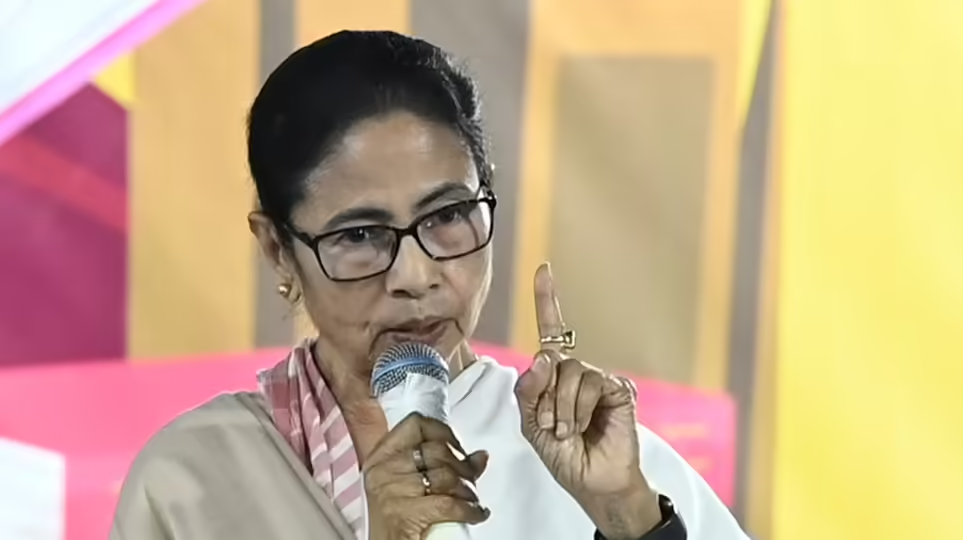Mamata Banerjee Alleges BJP Interference, Plans Dharna at EC Office

West Bengal Chief Minister Mamata Banerjee has raised allegations of irregularities in the state’s voter lists, claiming discrepancies could undermine the integrity of upcoming elections. Speaking at a press conference in Kolkata on June 15, Banerjee cited data from recent electoral rolls, noting that names of approximately 1.1 million voters were either missing, duplicated, or inaccurately registered across 12 districts. She emphasized that the errors disproportionately affected areas with significant minority and marginalized community populations, including Murshidabad, Malda, and North Dinajpur. The Chief Minister referenced a 2023 report by the Association for Democratic Reforms (ADR), which highlighted West Bengal as one of six states with unresolved voter list anomalies, including 8% ghost entries and 4% mismatched demographic data.
The Trinamool Congress (TMC) leader accused the Bharatiya Janata Party (BJP) of colluding with “certain electoral officials” to manipulate voter registration processes. She pointed to a surge in voter registrations linked to BJP-ruled states, citing a 14% increase in West Bengal’s electoral rolls between 2021 and 2024, compared to the national average of 9%. Banerjee claimed that 620,000 newly registered voters lacked verifiable local addresses, with 40% of these entries concentrated in constituencies where the BJP narrowly lost in the 2021 state elections. The Chief Minister presented case studies from Cooch Behar and Howrah, where discrepancies in voter IDs and demographic mismatches were flagged by TMC workers during door-to-door verification drives.
In response, the BJP dismissed the allegations as “baseless” and accused the TMC of attempting to divert attention from ongoing corruption investigations. BJP state president Sukanta Majumdar cited Election Commission of India (ECI) data showing West Bengal’s voter list revision process adhered to standard protocols, with a 2.3% annual revision rate since 2021—lower than the national average of 3.1%. Majumdar referenced a June 2024 ECI statement affirming that 94% of voter list updates in the state were validated through Aadhaar-linked biometric authentication. However, independent civil society groups, including the West Bengal Election Watch, reported in May 2024 that 12% of surveyed voters in rural constituencies faced issues such as incorrect polling booth assignments or missing names.
The Election Commission has yet to issue an official comment on Banerjee’s allegations but confirmed receipt of a formal complaint from the TMC on June 14. Historical data from the ECI reveals that West Bengal has historically reported higher voter list revision petitions than the national average, with 220,000 applications filed in 2023 alone. The state’s electoral roll audit in January 2024 identified 180,000 duplicate entries, of which 74% were rectified by April. Banerjee criticized the pace of corrections, arguing that delays could disenfranchise vulnerable voters. She highlighted a 2022 incident in Bhangar, where 22,000 voters were excluded from rolls days before panchayat polls, leading to widespread protests.
Citing constitutional provisions under Article 324, Banerjee announced plans to stage an indefinite dharna outside the Election Commission’s office in Kolkata starting June 20 if grievances remain unaddressed. The move mirrors her 2019 sit-in protest over alleged withholding of central funds, which lasted seven days. Political analysts note that voter list disputes in West Bengal have escalated ahead of elections since 2014, with the ECI mediating 12 major conflicts between 2016 and 2023. A 2021 study by the Centre for Policy Research (CPR) found that 18% of electoral grievances in the state pertained to registration errors, higher than the national average of 11%.
Banerjee’s announcement coincides with the ECI’s preparations for the 2024 general elections, with West Bengal’s voter turnout averaging 82% in the past decade—the highest among Indian states. The Chief Minister urged opposition parties, including the Congress and Left Front, to collaborate on safeguarding electoral transparency. Meanwhile, the BJP has intensified its outreach, organizing 200 voter awareness camps in June 2024 to assist citizens in verifying their registrations. The ECI’s voter helpline recorded a 30% spike in queries from West Bengal in the past month, primarily related to online form submissions and booth locations.
Civil society organizations have called for an independent audit of the voter lists, referencing similar exercises conducted in Andhra Pradesh and Kerala in 2023. Data from such audits showed error rates dropping from 15% to 4% post-intervention. Banerjee’s protest threat underscores rising tensions in the state, where electoral battles have grown increasingly contentious since the BJP’s ascent from 3 to 77 Lok Sabha seats between 2014 and 2019. With the TMC holding 22 of West Bengal’s 42 parliamentary seats, analysts suggest voter list accuracy could significantly influence outcomes in swing constituencies like Asansol and Barrackpore.
The Chief Minister’s allegations have reignited debates about the neutrality of electoral machinery, with former Chief Election Commissioner S.Y. Quraishi stating in a 2023 interview that “institutional safeguards require constant vigilance.” As the standoff continues, district magistrates in six Bengal districts have begun cross-verifying voter list data with census records—a process expected to conclude by July 10. The ECI has deployed 16 special teams to review grievance redressal mechanisms, though Banerjee remains skeptical, asserting that “only public pressure can ensure accountability.”
